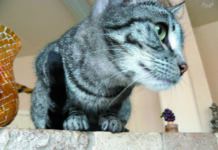Diabetes is an expensive disease, with insulin injections for some cats easily reaching $100 a month. It’s also a terribly inconvenient one. Shots of the hormone insulin need to be given every 12 hours with little margin for error, so a pet owner’s schedule revolves around administration of the medicine. The disease is all too common, ranked as one of the top hormonal illnesses of cats.
The good news: Diabetes in a cat can often be controlled by lifestyle. In fact, by one estimate, at least 60 percent of cats diagnosed with diabetes are able to go off insulin if the right lifestyle measures are put in place.
That’s because most cats develop type 2 diabetes, meaning the body becomes resistant to insulin’s efforts to have sugar removed from the bloodstream, but it doesn’t stop producing insulin altogether. (Dogs and their owners are not so lucky. A dog’s diabetes tends to be type 1 — the kind that requires injections of insulin for life because the body simply stops making it.)
The steps for working to get a diabetic cat off insulin
Act quickly. The sooner you act to control your cat’s diabetes once he is diagnosed, the better his chance of going into diabetic remission. Immediately start giving him his insulin injections religiously, go in for glucose (blood sugar) monitoring at the intervals recommended by your veterinarian so she can tweak the dose as necessary, and put your cat on the diet prescribed.
Diet. A therapeutic diet, available by prescription from your veterinarian, is the way to go. That’s the best option for insuring that your cat is eating a diet that is lower in simple carbohydrates, which can cause blood sugar to spike too high. In some cases, the vet will also prescribe a diet that is higher in fiber than what the cat has been eating. Fiber helps slow the release of sugar into the bloodstream.
Weight management. Many cats with diabetes are overweight, and losing extra pounds can help take them off insulin injections. It can be complicated, because lower-carbohydrate diets are often relatively high in fat, which is particularly calorie-dense. The vet will help you work out appropriate portion sizes so that your cat loses weight in a healthful manner.




